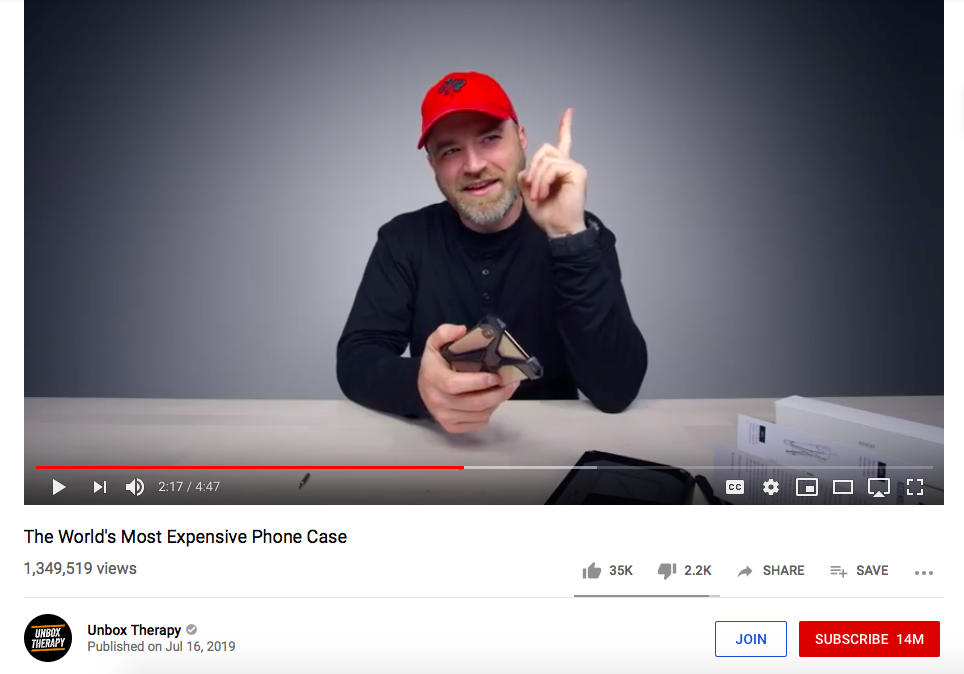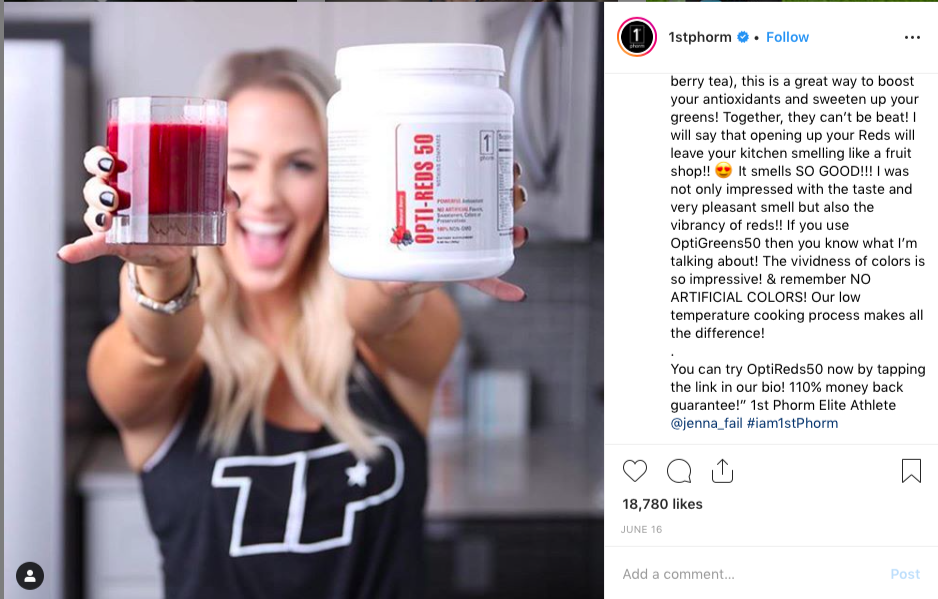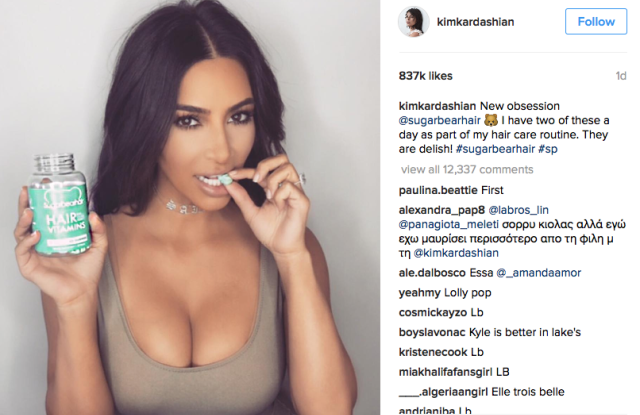What is it That Define a Social Media Influencer? What is the definition of an influencer?
If you have even just a tiny bit of experience with influencer marketing, you probably think you know the answer to this question.
But do you really know what a social media influencer is?
What is it that defines one?
Over the years, the term influencer has started to get thrown around a lot.
This contributes to misconceptions and misunderstandings of what a social media influencer really is.
Today, it feels like everyone is calling themselves influencers on social media, but are they really right in the right to do so?
When I am scrolling social media, I often come across accounts with one thousand, two thousand, or even five hundred followers that write “influencer” in their profile description.
But is it really what you write in your bio that is the determining factor in making you an influencer?
Well, if it would, we’d all be influencers.
Or, is it the follower count that makes people influencers?
Once you reach a certain level of followers, do you become an influencer?
So many questions, but so few answers.
In this article, I’m digging into a topic that a lot of people are just throwing around and discussing shallowly. In this article, I am getting to the bottom of what a social media influencer is, and what it is that defines a social media influencer.
Bear with me, because this is about to get interesting.
What does “influencer” mean?
Let’s begin by looking at what the term influencer means.
Maybe that can help us better understand the terms social media influencer’s true definition.
The word comes from “influence”, and per Dictionary’s definition, influence is:
“the capacity to have an effect on the character, development, or behavior of someone or something, or the effect itself.”
An influencer would then just be a person that has those characteristics and that power.
And that makes sense, but while we have a definition, it’s hard to draw the line, right?
How do you even know if a person has influence over people?
Influencer marketing has shown to be tremendously effective, and one of the main reasons why is that people trust the recommendations by influencers. In other words, they look up to the influencers and are influenced by what they are saying. A successful influencer has an audience that they’ve built a relationship with, making them engaged and loyal.
On the other hand, when a brand promotes itself, very few people actually listen to what it says, and more importantly, trust what the brand is saying.
The reason for this?
People know brands have one goal and one goal only: to sell more, whereas the influencer’s goal is to guide their audience.
As you can expect brands will be able to drive much better results by partnering with influencers who actually get listened to rather than just completely ignored.
But the major problem still hasn’t gotten answered:
What is it That Define a Social Media Influencer?
We’ve already gotten the definition of an influencer, but where do you draw the line?
Because based on the definition, almost everyone is an influencer, because we’ve all influenced a friend into buying something or choosing the same food as us, or influenced their decision in some other way, right?
And I know many of you have influenced your friends by posting something on social media, for instance, if you’re spending your vacation in a particular place, and then later, they go there.
Does that make you a social media influencer?
When talking about influencers and influencer marketing, we’re usually talking about influencers in the term “do they have the power to get people to buy?”.
Because ultimately, that’s the way social media influencers monetize, whether it be promoting other brands and driving sales for them, or leveraging their own audience on social media to sell something themselves.
When it comes to influencer son social media and the people who are called social media influencers, I think we can agree on the fact that they need a somewhat large audience.
Sure, based on the first definition, it may seem like you can have 5o followers and still be an influencer, but no matter who you ask, they’ll agree on the fact that social media influencers need to have a somewhat large audience base.

This brings me to the next thing.
It is often spoken about three types of influencers
- Micro-influencers
- Influencers
- Celebrity influencers
You might also have heard:
- Micro-influencers
- Mid-size influencers
- Macro influencers
What is a social media influencer?
The number of social media users has skyrocketed over the years.
Today, there are more than 3.028 Billion people actively use social media, which roughly translates to about 40% of the world’s population.
That’s quite a lot.
In other words, social media is where the attention is.
The influencers that succeed in grabbing the attention of their audience are able to build a strong and loyal following of industry-relevant followers who trust and look up to the influencer.
People regularly go to the influencer for inspiration, tips, and advice, because the influencer is seen as a leader in its industry.
The reality is that brands can give up the dream of establishing as much trust as the influencer has, and for some brands and industries, to grow as many followers as the influencer.

As a result, the best thing to do would just be to partner with the influencer and have them recommend the brand and products to their audience, right?
So that’s what many brands do.
And it works extremely well.
The only challenge is being able to distinguish great influencers from bad influencers, and influencers from people who pretend they are influencers.
And trust me, doing so can be quite a challenge.
Take a look at this interview Forbes did asking people what a social media influencer is, as well as interviewing some of the leading social media influencers:
Follower count doesn’t matter?
When it comes to defining what a social media influencer really is, follower count is often the factor that most people look at when trying to determine whether or not they are an influencer.
And I don’t argue, it’s an important factor that can give us an indication of influence, but it doesn’t tell us if a person really has influence or not.
Obviously, in order to be able to impact people and influence their thoughts and decisions, you need to have an audience of people.
And obviously, the bigger of an audience you have, the bigger of a chance you have to influence people.
In theory, you could be an influencer with 50 followers, but in practice, you can’t, because it is impossible for you to reach and impact people at scale – something that brands want when partnering with influencers, and ultimately the thing that will allow you to monetize your social media audience.
This is the reason why most people emphasize follower count when looking at who is an influencer and who is not.
All of this makes follower count most certainly an important factor in identifying a social media influencer, but it is far from the only one you should be taking into consideration.
In fact, what is even more important than the follower count itself is that the followers look up to the influencer, and trust them.
The main reason why influencer marketing is so effective is, as mentioned earlier, because of the fact that influencers are trusted individuals.
If an influencer gives a recommendation, people will take their word for it, and trust them that it is the best hair wax they’ve ever tried.
But what if you just have a large audience that just sits there and doesn’t really listen to what you have to say?
Then follower count means nothing in making you an influencer.
It won’t matter how many followers you have.
But this is also the problem in today’s influencer marketing landscape.
Today, it is easier than ever to buy fake followers and make it seem like you’re an influencer with influence – at least to the individuals who don’t have a lot of knowledge within that area.
This ultimately means that they can trick brands into paying them for marketing and pretend like they have this huge audience of loyal followers, while the fact is that their followers are nothing but bots and fake followers.
Influencers have authority
Apart from being trusted individuals, what makes a social media influencer is that they are known to be experts in a particular area and niche.
The influencer shares content related to that niche and attracts people who are genuinely interested in the niche that the influencer is in.
This is great for brands who want to partner with influencers because it provides them with an effective way of targeting their audience.
Obviously, as a brand, you only want to reach the people who truly matter to your brand, and since the influencer has attracted people within a particular industry, it allows the brand to drive better results.
You don’t have to be the leading individual in your industry, but you definitely have to be a leader in your industry.
Let’s look at what separate the different types of influencers apart:
Celebrity influencers
Influencer marketing has its roots in celebrities, but as social media came along, everyone has now got a voice.
Back in the days, the only one you looked up to were the celebrities, thus granting them lots of marketing power.
Celebrities normally have a huge following with over several million followers on social media today, but as mentioned earlier, follower count isn’t everything.

Followers normally charge a lot more to promote brands compared to “regular” influencers – even if they have the same amount of followers, only because they have their name attached to the campaign and product.
What’s more, celebrities generally have a less targeted audience than regular influencers.
Take Selena Gomez for example.
Do you think the vast majority of her followers are deeply passionate about music?
Of course not!
So, therefore, if Gomez would promote studio equipment for people who love music, not a lot of people would convert, right?
At least not percentage-wise.
Regular influencers, on the other hand, and I mean people who really are influencers have an engaged audience that s passionate about the same industry as the influencer is operating in.
Another thing that tends to decrease the results of celebrity influencer marketing campaigns is that they are less trustworthy than regular influencers.
The problem is that celebrity influencers can’t possibly have the time to build relationships with their audience, and since the celebrity influencer hasn’t built strong relationships with their audience by engaging with it, the audience won’t be as loyal – maybe “fan” loyal, but not “loyal loyal”.

“Regular” influencers
Regular influencers are individuals with a follower count of generally 100K and up.
The difference between influencers and celebrity influencers is that celebrities haven’t built their audience of loyal fans from social media but with their fame, whereas the social media influencer has established themselves as industry leaders in their industry with the help of social media.
Micro-Influencers
The only difference between a mid social media influencer and a micro-influencer is their follower count.
Personally, I believe that it gets a little misleading as follower count is far from the most important metric for being a successful influencer, but hey, that’s the definition people use, so that’s what we’ll have to go with for now.
Micro-influencers are generally defined as individuals with a follower count of 5K to 100K.
These have a smaller following, however, they are also known to have a more engaged audience, and to build more personal and deeper connections with their audience, thus making micro-influencers often have much more trust.

What is a social media influencer? Industry leader
As I’ve touched on briefly, a social media influencer is a person that is known to be an industry leader.
This is also part of the reason why it is impossible to be an influencer with 50 followers.
If people don’t know about you, it’s hard to be an industry leader.
People need to see an influencer as a person they go to for information, tips, and inspiration within a particular industry.
In other words, a go-to person within the industry the influencer is in.
Conclusion
As you can see, giving a definition of what a social media influencer really is is difficult. Different people have different perspectives, opinions, and thoughts, and there is not really a definition that the whole industry has agreed on yet.
Therefore, knowing where to draw the line of who is an influencer and who is not can certainly be a difficult thing. But hopefully, this article has given you some sort of guidance and idea of what to look for.


